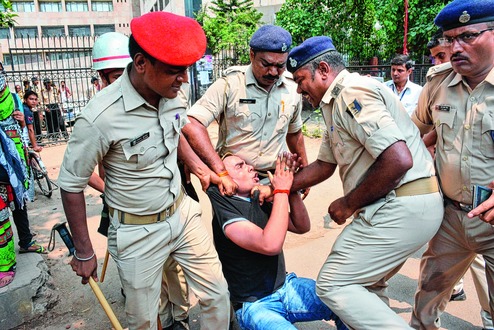
Chief minister Nitish Kumar has asked for an action plan to improve the standard of education in Bihar but academicians say the rot that has set in over the decades first needs to be reversed if any change has to be brought in.
The Bihar State Examination Board (BSEB), under fire last year over the toppers' scam, took a series of steps to crack down on use of unfair means: it cancelled the affiliation of 200 ambiguous institutions churning out "first divisions" for years in the Intermediate exams; tightened security at exam centres by carrying out intensive frisking of examinees; banned mobile phones in the test centres and made it mandatory for DMs and SPs to send a daily report apart from introducing the coding system to ensure nobody knows where the answer sheets have gone for evaluation.
One of the impacts of these measures is that the percentage of students who passed plummeted from about 90 in 2016 to 35 this year, which implies that one in about three examinees failed.
Academicians say the problem does not lie with the examinations, rather it is the rot that has set in the system: there is a massive shortage of teachers and those who are being hired are under-qualified; teachers are made to work of non-teaching staff; classes are not held regularly, infrastructure is bare minimal...
Former CPI MP Shatrughan Prasad Singh, who has been running the Bihar Secondary Teachers' Association for decades, said: "The main problem is that there are no teachers to take classes. In science subjects, there is a shortage of 6000 teachers and in humanities, there is a shortage of over 10,000 teachers. The shortage of teachers is going on for more than two decades. Many schools have been upgraded without additional teachers and teachers are made to do every non-teaching job - distributing cycles, uniforms, scholarship and ensuring online filling up of forms."
Praveen Kumar, aged around 30, is a botany teacher in a higher secondary project school in Jehanabad from 2009. "The school is supposed to have 14 teachers in the plus-2 section. There are just four. There is no teacher of physics, chemistry, maths or even English. Yet 57 students from my school appeared in the plus-2 exams," he told The Telegraph, stressing that the story is similar in all the higher secondary schools in Jehanabad. Since there are no clerks in the school, the teachers spend six months of a year away from classes doing non-teaching work, Praveen said.
Educationists have questioned the change in mode of appointing teachers by the Nitish Kumar government in 2006. Previously the recruitment was made through the Vidyalaya Sewa Board. In 2006, the rules of appointment were changed and the hiring was done by either the secretary of the panchayat or the executive official of the local municipal bodies. "The quality of teachers suffered as there was rampant corruption in appointments. The government made another change by appointing contract teachers with lesser pay-scales. Despite being absorbed into service they still get lesser pay than regular teachers. If you give peanuts as salaries, one generally ends up appointing monkeys," said an educationist who did not wish to be named.
In the late 1960s, politicisation of education started in Bihar with the then chief minister Mahamaya Prasad Sinha addressing students as "jigar ke tukre (pieces of my heart)" in his public speeches. During the JP movement, when the Sarvodaya leader asked students to boycott exams, the state government responded by allowing free-for-all exams. The trend has continued with successive governments unwilling to take on "student anger". Later the introduction of "no-aid education system" saw mushrooming of schools and Intermediate institutions that were given affiliation which allowed persons like Bachcha Rai to manipulate the system in connivance with government educational agencies. Successive governments did not do anything to improve the quality of teaching. During the Lalu-Rabri regime, 1.5 lakh Siksha Mitras (para-teachers) were appointed whose services have since been regularised despite serious doubts about the quality of teaching they can impart.
It only takes a strict exam to expose the hollowness of secondary education. Now Nitish Kumar has asked the education officials to make a roadmap to improve secondary education. It will be a long road to revive a system which has been allowed to sink for over four decades.










